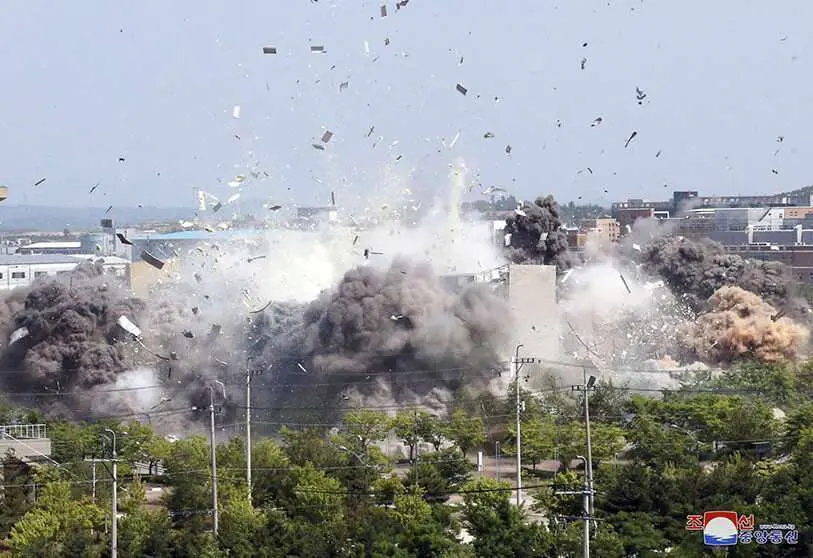Unleashed aspirations

The pandemic has not altered the course of ambitions, nor the existential struggles: while North Korea blows up a diplomatic liaison office building with South Korea, located in the city of Kaesong, in North Korean territory, Iran literally launches an "arrest" order against Donald Trump, accused of the murder in January of the Iranian general, Qassem Soleimani, head of the Quds Force of the Revolutionary Guard.
Iran's prosecutor's office has asked Interpol to place the US president among the most wanted men accused of "murder" and "terrorist act" after Ali Qasimehr, the Tehran prosecutor, issued arrest warrants for 36 people involved in Soleimani's murder.
There is another front going on at the UN between the U.S. and Iran over the arms embargo on the Persian nation. The White House is manoeuvring to get the UN Security Council not to lift the arms embargo--which is set to expire on October 18--but to extend it much longer.
With the dispute for control of the Middle East with the Syrian front open, US strategists consider it essential to maintain the embargo and prevent Iran from obtaining a predominant role not only in Syria but also in Yemen.
According to a document sent by the American Union to the UN, as soon as the embargo is lifted it will happen that "Tehran will order the purchase of Russian planes capable of attacking within a radius of 3,000 kilometers" and will expand "the fleet of submarines" since its intentions to obtain "a nuclear bomb" are questionable.
Neither China nor Russia look favourably on the US intentions, while Tehran continues to press for the trade sanctions and restrictions on the sale of its oil to be lifted as soon as possible; in fact, as a result of these sanctions, the Iranian community in Spain has denounced to the Ministry of Foreign Affairs the freezing of its bank accounts.
"Having quit the JCPOA, the United States is no longer a participant, and has no right to trigger the snapback mechanism at the Security Council," Zhang Jun, the Chinese representative to the United Nations, said via telematics. In turn, Mohammad Javad Zarif, Iran's Foreign Minister, reiterated that "the preservation of the Nuclear Agreement" depends on the lifting of the arms embargo against it. "The timetable for the removal of arms restrictions embodied in Resolution 2231 is an inseparable part of the hard-won compromise, and any attempt to change or amend the agreed timetable is thus tantamount to undermining Resolution 2231 in its entirety," Javad Zarif said.
Then there is Russia: the advance of the pandemic delayed the referendum promoted by President Vladimir Putin on April 22 in favor of amending the Constitution and introducing 206 amendments, including changes in the Executive and the Legislative. The approval of the reforms would allow current President Putin to return to the ballot box; he remains as President of the Russian Federation from 2012 "a position he previously held between 1999 and 2008"; and he was also Prime Minister from 2008 to 2012.
The referendum to ask Russians whether they are for or against the constitutional amendments began on June 25 and ended on Wednesday, July 1; according to the Central Electoral Commission, the popular vote endorsed all the proposed changes with 77% of support.
Thus, the 67-year-old politician could remain in power until 2036, provided that in 2024, after his term of office ends, he stands again as a candidate; the reforms would even grant another electoral opportunity in 2030 to conclude in 2036. The ex-KGB agent, born into a humble family in St. Petersburg, would govern for a total of 36 years, longer than the Communist dictator Joseph Stalin (1927-1953), who had been in power for 31 years, or Catherine II, considered the mother of the Russian Enlightenment, who had reigned for 34 years.
A striking fact: Stalin died on March 5, 1953, when Putin was about to turn 5 months old; these are two figures that in time sum up the epithet of an era of changes and transformations of the Russian motherland in the 20th century and the emerging 21st century; of the concentric position of the USSR as the axis of a model with satellite economies around it and playing a role of world equilibrium counterpart to the United States under the Cold War.
Putin wants to make Russia a strong player in an international sphere with several preponderant strategic actors and with two juxtaposed poles such as China and the United States, with the Asian giant taking over the international scene at an accelerated pace. Russia is looking for a place and not as a satellite of China.
Putin also wants to be an international interlocutor due to its proximity to China, India, Turkey, Saudi Arabia, Iran, Israel, North Korea, France, Germany and Syria. He tries to cunningly manage the adverse global scenario.

